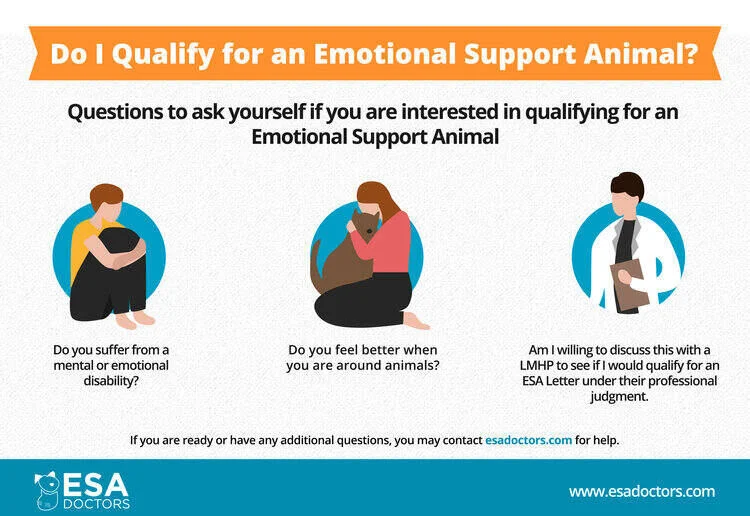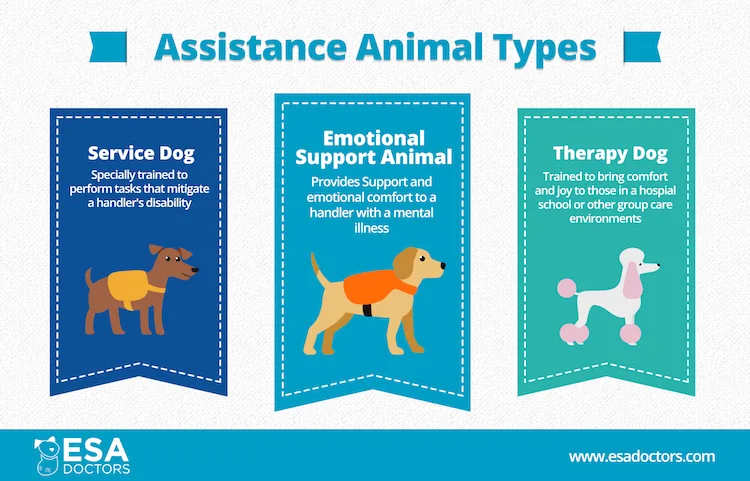An Emotional Support Animal (ESA) is an animal that provides therapeutic companionship for individuals with mental health or emotional disorders.
Emotional Support Animals have special legal rights. They are allowed to live in no-pet apartment buildings free of charge (that also means no extra security deposits). Housing providers are also prohibited from limiting an ESA due to its size or breed.
For an animal to be considered an official Emotional Support Animal, a licensed mental health professional (psychologist, therapist, doctor, social worker, licensed counselor, registered nurse, etc.) must determine that an Emotional Support Animal is recommended for a person’s mental health and well-being.
Emotional Support Animals are most commonly dogs and cats, but they can be any small domesticated animal traditionally kept in the home for pleasure.
If an LMHP determines that their client would benefit from having an Emotional Support Animal, they can write an ESA Letter that the client can use to have protection under federal law.
If you believe you may be a good candidate for having an emotional support animal, your next step is to get an ESA Letter. If you would like our support in connecting with an LMHP, you can get started by clicking the link below.
Do I qualify for an Emotional Support Animal?
If you are interested in seeing if you qualify for an Emotional Support Animal and want to learn more, you may find the information below helpful.

You may qualify for an ESA Letter if you suffer from an emotional or mental health condition for which an Emotional Support Animal provides relief. Examples of eligible emotional or mental conditions include:
- Anxiety
- ADHD
- Post-Traumatic Stress Disorder (PTSD)
- Agoraphobia (fear of leaving home)
- Depression
- Anxiety Disorders (both Generalized Anxiety and Social Anxiety)
- Panic Disorders
If you experience any of the conditions described above, it might be time to work with your doctor or therapist to address your mental health issues and also see if you qualify for a real ESA Letter.
It is important to work with a licensed health care professional who is familiar with Emotional Support Animals so they can support you in answering any questions you may have and help you deal with your landlord. If it isn’t an option for you to see someone in person, ESA Doctors can help pair you with a licensed health care professional who is a specialist in this space to support you online.
Living with an Emotional Support Animal
Knowledge is Power: Understanding the Rules for Emotional Support Animals (ESA) to Make Informed Decisions for Your Mental Health & Wellbeing
ESA Doctors, est. 2015
One benefit of working with an LMHP to qualify your animal as an official ESA is to protect yourself against discrimination in housing. Under the Fair Housing Act (FHA), landlords must provide “reasonable accommodation” for Emotional Support Animals regardless of whether or not a building maintains a “no pets” rule for its residents.

If an individual with an ESA applies for a lease in a “no-pets” community or is a current resident seeking to live with their ESA, they must disclose their emotional support animal to the landlord and request accommodation for their ESA.
The housing provider or landlord is allowed under Fair Housing rules to request documentation that establishes that the tenant has a mental health disability and that their Emotional Support Animal alleviates symptoms of that disability.
The tenant satisfies this requirement to provide documentation by presenting an ESA letter from their licensed health care provider. If a property manager unfairly denies an applicant with sufficient proof of an animal’s ESA status, that applicant may report and file an official discrimination complaint against the property manager/owner with the Department of Housing & Urban Development’s Office of Fair Housing and Equal Opportunity.
ESAs are not considered pets under Fair Housing rules, and policies that pertain to pets do not apply to ESAs. For example, landlords are not permitted to charge deposits and fees in connection with ESAs, or enforce breed or weight restrictions, even though such policies may apply to regular pets.
Traveling with an Emotional Support Animal
Unfortunately, due to regulatory changes, the Air Carrier Access Act no longer allows emotional support animals on flights. In past years, ESAs were allowed to accompany their owners free of charge, but that is no more. The only type of assistance animal for mental health allowed on flights for free is a Psychiatric Service Dog (PSD).

A Psychiatric Service Dog is different from an Emotional Support Animal because PSDs are trained to perform a job or task relating to the owner’s disability. For example, PSDs provide pressure therapy during times of crisis, retrieve medication, or “break the spell” during dissociative events. There are numerous vital tasks that PSDs are trained to perform for their owners.
To travel on an airplane with a PSD, you must complete and submit the DOT’s Service Animal Air Transportation Form.
PSDs are allowed to board the cabin free of charge and are not subject to the same size limitations as normal pets. You do not need any type of certificate, ID card, or letter for a PSD. However, many owners choose to get PSD letters for peace of mind from their healthcare providers.
If you are interested in a Psychiatric Service Dog Letter, we can connect you with a licensed healthcare provider. Click below to get started.
Going to School with an Emotional Support Animal
In 2015, the U.S. Department of Justice and the University of Nebraska at Kearney settled a civil rights lawsuit that determined Federal Law requires universities to accommodate students who need ESAs “in order to have an equal opportunity to enjoy the benefits of university housing.”
As rates of anxiety and depression continue to soar on college campuses across the country, these legal protections have empowered more students to bring their Emotional Support Animals to live in on-campus housing.

What’s the difference between an Emotional Support Animal (ESA) and a Service Animal?
It is common to get ESAs and Service Animals confused. Unlike Service Animals, ESAs are not specifically trained to perform tasks directly related to an owner’s disability. The Americans with Disabilities Act (ADA) regulates Service Animals and provides that all Service Animals may accompany persons with disabilities into all businesses open to the public or “places of public accommodation.”
Unlike a Service Animal, an Emotional Support Animal does not have automatic access to places of public accommodation, such as restaurants, hotels, and stores.
As previously discussed, however, ESAs do have protections under federal law regarding housing. While most ESAs are dogs, a wide variety of animals can qualify, including cats, rabbits, small birds, hamsters, gerbils, rats, other rodents, fish, turtles, and other small, domesticated animals. On the other hand, Service Animals can only be dogs.

Steps to qualify for an Emotional Support Animal
- Determine your need for an Emotional Support Animal
- Contact your health care professional or connect with one online to request an evaluation
- Obtain a signed ESA letter from your licensed healthcare professional
- Submit your ESA letter to your landlord
Now that you know some of the benefits of having an emotional support animal and the basic rules regarding ESAs, you can feel confident and empowered to make your own decision about qualifying for a legitimate ESA.
You are not required to register your Emotional Support Animal, and certifications and licenses do not confer official status on your ESA. The only way to obtain an ESA letter is through a licensed health care provider.
If you do not have a licensed health care provider or are having trouble finding one in person, you can reach out to ESA Doctors, who can help connect you to a licensed professional online.

Get the Love and Support you deserve!









I have (2) Senior ESAs. A 12yr old dog and a 15yr old cat. In addition to the two I have a 2yr old Chihuahua that fills my life with funny everyday aspects of his world. He even brings joy and love to my older ESA animals. The young ESA brings the older ESAs back to life since all they want to do is sleep more and eat and poop. So having this younger dog is perfect for us all BW needs a younger ESA to lessen the effects of her disability and keep her from isolating herself from others which is detrimental to her existing disabilities. BW currently suffers from PTSD from a tragic death of a dear friend just 4yrs ago that lived in the same dwelling/apts where she currently lives at, also. She has witnessed alit of deaths in a short time in these apts where she calls home. The young ESA keeps her happy and provides long term companionship and help with her disabilities that might otherwise keep her from enjoying life as she knows it. You may want to refer to the Fair Housing Act that says the Landlord is legally obligated to accommodate the said animal in addition to BWs older ESAs.. The accomadation described allows this animal to live in her apt free of charges like pet rent and pet deposits of any kind.
We have written extensively about Fair Housing rules, for example: https://esadoctors.com/hud-housing-rules-emotional-support-animals/